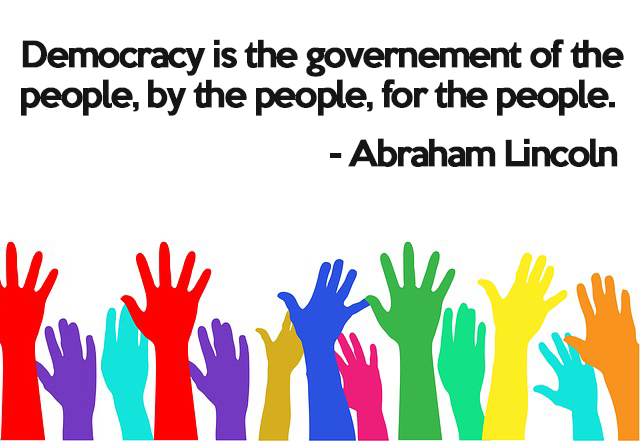The human race, as a whole, owes a great lot to the Greeks. One of the most ancient civilizations to have flourished in the world, they were the forerunners in a great many areas, including literature, sports, and politics. They gave us Homer and Socrates, the marathons and the Olympics, and, greatest of all, they gave us democracy. Today, the majority of the nations across the world follow the democratic system of government. It is almost universally held as one of the fairest systems, characterized by its principle of a government that is of the people, for the people, and by the people.

Democracy is the government of the people, for the people, by the people. – Abraham Lincoln
Here, let us see what has made democracy survive and spread over the course of the many centuries since it was first conceived.
People come first: Theoretically at least, the biggest advantage of democracy is that people always come first in the system. In a democratic nation, all laws are created with the best interests of the citizens at heart. It does not serve any particular community of person; instead, a democratic nation will treat all the citizens equally. To facilitate this purpose, the heads of state are chosen by the people of the nation, in accordance to their performance and ability to serve the people.
Build performance pressure on the government: In a democracy, the people get to choose who would become their next leader. As a result, widespread unpopularity of an elected leader might lead to termination or impeachment. Naturally, keeping in mind those factors, leaders face the constant pressure to perform. There must be concrete evidence of good work before the leader can hope to be elected to office, and the work must continue in order to enjoy the position of the leader of a country.
Public voice is not suppressed: A democracy is inherently designed to ensure that there is no public uprising against the government. Yet, it is democracy that allows considerable scope for a mutiny. Since the public opinion is of utmost important in a democratic nation, outrage over the behavior of an elected leader can lead to public unrest. What’s more important is the fact that in democracies, it is legally permitted to speak up and act against the government via peaceful means.
Stable administration: In a democratic country, the administration is elected by the people at regular intervals, and the layers of government act as a check on the system as a whole. This leads to a far more stable administration than in, say, monarchy or a dictatorship. Both the later forms suffer the risk of coming to an abrupt end by overthrowing by rivals, or assassination by rivals or unhappy subjects. Moreover, having a single head of state makes it difficult for the leader to oversee the entire nation, especially if it is a large one. Layers of government at provincial, state, and central levels ensure that no area goes unnoticed and ungoverned.
Equal treatment of all: In a democracy, each citizen is treated as an equal, irrespective of sex, creed, color, faith, and influence. Due to this, everyone is equally protected by the law, and everyone is equally susceptible to prosecution by the law in case of offense. Minority communities benefit especially from this system of government, as their citizenship status grants them full rights as the rest of the community, and the prejudices of any particular community or person are not considered valid.
It prevents corruption: Democratic governments are characterized by a biparty or multiparty system. A government cabinet is also formed of representatives from all parties, in accordance to their representation. As a result, the ruling party is kept in check by the presence of the opposition, and corruption is ideally kept at a minimum. Moreover, unlike monarchy or dictatorship, complete power is not in a single hand, and, since power is bestowed by majority votes, and the government is ultimately answerable to the people for its actions, it is not beneficial to be corrupt at the cost of the nation’s detriment.
People are more politically educated: People are an intrinsic part of the democratic system. Educated voting makes for the most efficient government that people will benefit from, which acts as an incentive for people to become more politically aware. Since people have the power in their hands, they are more interested to learn of their rights and duties, making for more responsible citizens. Besides, the more they know about the current political situation, the more aware they are of the required changes and of what they can do to implement the same.
Also read: Importance of freedom of expression
Truth be told, today democracy is not what is started out as. A number of theoretically democratic nations across the world are guilty of gross violation of its principles. It is necessary that these nations work towards being more adherent to the democratic principle, which is still a far better and fairer system than authoritarianism or monarchy.
Very well written essay. Democracy is really important for the freedom of living. In a democracy, people feel more free. But most of the govt. try to take things in their hands which is not good for the democracy. Govt. try to control media so that they can change the thinking of the citizens.
wonderful essay and description. thanks
I’m sorry, but isnt it obvious that not everyone deserves to be treated equally? Everyone is different and should therefore be treated differently.